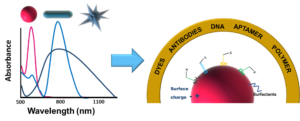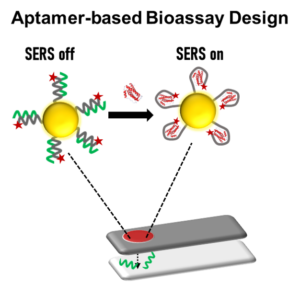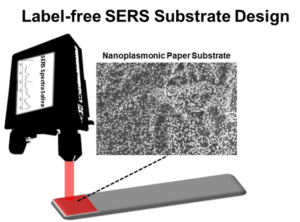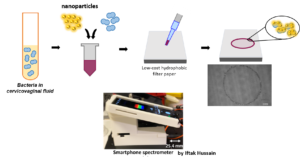Research Projects
Overview
The Locke Biosensing lab is dedicated to designing point-of-care diagnostic tools using light-based technologies and nanoplasmonic structures that can be used to detect and monitor diseases rapidly and non-invasively. We also focus on understanding current clinical needs, including those in low-resource settings through various clinical and interdisciplinary collaborations.
Nanoparticle Design and Functionalization
The basic understanding of plasmonic structures and how to best design them for biosensor applications is explored. We seek to understand their plasmon resonance, surface-chemistry functionality, and bio-stability to better design nanoparticles for various biosensing applications.

Surface-enhanced Raman Spectroscopy
Pediatric Eosinophilic Esophagitis
Eosinophilic Esophagitis (EoE) is a chronic immune-mediated disease that affects the esophagus. In late stages, this allergy-associated condition causes chronic dysphagia and food impaction requiring immediate endoscopic intervention. However, in pediatric cases, the symptoms are less distinguishable from other esophageal disorders (i.e., Gastroesophageal reflux disease). The current clinical approach requires a two-step process that is burdensome, especially for young children. Therefore, the objectives of this project is to design of a novel biomarker detection platform towards non-invasive monitoring of EoE at the point-of-care. To accomplish this goal:
Surface-enhanced Raman spectroscopy and mass spectroscopy are used to 1) explore the relationship of salivary cytokine interleukin-5 to active EoE, and 2) identify additional EoE biomarkers based differences in the saliva biochemical composition compared to non EoE controls.


This project is in collaboration with Monroe Carell Jr. Children’s Hospital at Vanderbilt University Medical Center (Dr. Girish Hiremath, Department of Pediatric Gastroenterology, Hepatology, and Nutrition).
Colorimetry Sensing
Colorimetry sensing offer a means for the fabrication of low-cost, mobile sensing platforms for both at-home and remote point-of-care applications. One utility is in the detection of bacterial vaginosis a common issue in women’s health globally.

This project is in collaboration with the Bowden Biomedical Optics Laboratory (Iftak Hussain).